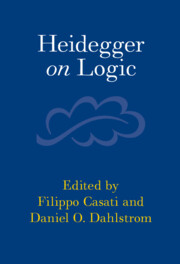Book contents
- Heidegger on Logic
- Heidegger on Logic
- Copyright page
- Contents
- Contributors
- Acknowledgments
- Method of Citation
- Introduction
- Part I Normativity, the Phenomenology of Assertions, and Productive Logic
- Part II Language, Logic, and Nonsense
- Part III Paradox, the Prospects for Ontology, and Beyond
- Chapter 7 Heidegger, Being, and All That Is and Is So
- Chapter 8 Logic and Attunement
- Chapter 9 Heidegger and the Authority of Logic
- Chapter 10 On the Limits and Possibilities of Human Thinking
- Part IV Logical Principles and the Question of Being
- References
- Index
Chapter 10 - On the Limits and Possibilities of Human Thinking
from Part III - Paradox, the Prospects for Ontology, and Beyond
Published online by Cambridge University Press: 15 September 2022
- Heidegger on Logic
- Heidegger on Logic
- Copyright page
- Contents
- Contributors
- Acknowledgments
- Method of Citation
- Introduction
- Part I Normativity, the Phenomenology of Assertions, and Productive Logic
- Part II Language, Logic, and Nonsense
- Part III Paradox, the Prospects for Ontology, and Beyond
- Chapter 7 Heidegger, Being, and All That Is and Is So
- Chapter 8 Logic and Attunement
- Chapter 9 Heidegger and the Authority of Logic
- Chapter 10 On the Limits and Possibilities of Human Thinking
- Part IV Logical Principles and the Question of Being
- References
- Index
Summary
This chapter addresses what Heidegger considers one of the basic problems of philosophy, that is, the alleged incompatibility between the notion of Being, our thinking, and logic. To begin with, it discusses how Heideggerians have dealt with this incompatibility by discussing what Casati calls an irrationalist and rationalist interpretation of Heidegger’s philosophy. Then, the chapter argues that both of these interpretations face exegetical and philosophical problems. To conclude, it defends an alternative way of addressing the incompatibility between our thinking, logic, and the notion of Being. In this connection Casati notes Heidegger’s suggestion, in some of his late works, that the real problem lies in the philosophical illusion that we can actually assess the limits of our thinking and, thereby, our logic. Heidegger’s philosophy aims, the chapter submits, at freeing us from such a philosophical illusion by delivering an experience that reminds us that we can never look at our thinking, as it were, from “on high,” i.e., from a standpoint that would enable us to grasp its limits or determine that it has no limits whatsoever.
- Type
- Chapter
- Information
- Heidegger on Logic , pp. 201 - 218Publisher: Cambridge University PressPrint publication year: 2022



